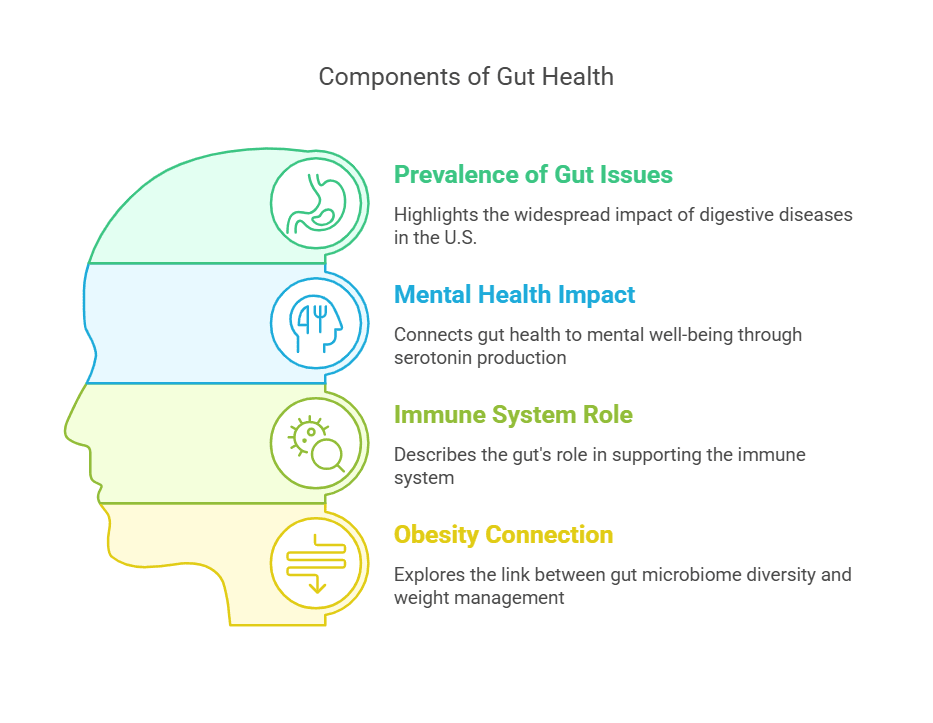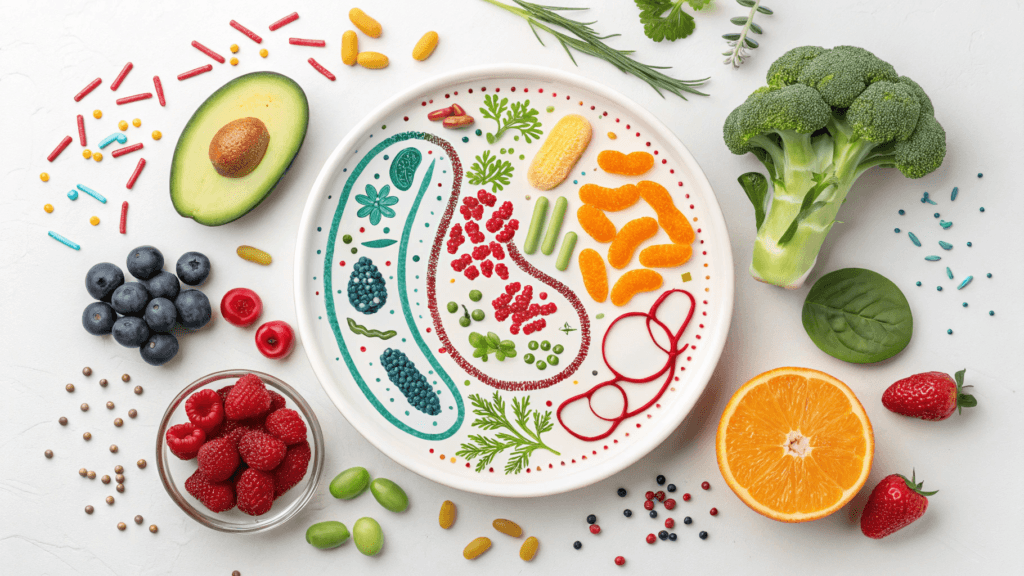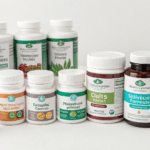In today’s fast-paced world, the importance of gut health is becoming increasingly recognized as a cornerstone of overall wellness. The phrase “Healthy Gut Healthy You” encapsulates the profound connection between our digestive system and our overall health. This article delves into the significance of maintaining a healthy gut, supported by statistics and research, while providing actionable insights to help you unlock your ultimate wellness.

Healthy Gut Healthy You : Understanding the Gut Microbiome
The gut microbiome consists of trillions of microorganisms, including bacteria, viruses, fungi, and other microbes that reside in our digestive tract. These microorganisms play a crucial role in various bodily functions, including digestion, metabolism, and immune response. Research indicates that a diverse and balanced gut microbiome is essential for optimal health.
The Statistics Behind Gut Health
- Prevalence of Gut Issues: According to the American Gastroenterological Association, approximately 60 to 70 million Americans are affected by digestive diseases, highlighting the need for awareness and proactive measures regarding gut health.
- Impact on Mental Health: A study published in the journal Nature Microbiology found that gut health is closely linked to mental health, with around 90% of serotonin (the “feel-good” hormone) produced in the gut. This connection emphasizes the importance of a healthy gut for emotional well-being.
- Gut and Immune System: The gut microbiome is responsible for about 70% of the immune system. A balanced gut can enhance immune function, reducing the risk of infections and chronic diseases.
- Obesity and Gut Health: Research published in Obesity Reviews indicates that individuals with obesity often have a less diverse gut microbiome compared to those with a healthy weight. This suggests that gut health may play a role in weight management.

The Gut-Brain Connection
Healthy Gut Healthy You : The gut-brain axis is a bidirectional communication system between the gastrointestinal tract and the brain. This intricate connection plays a crucial role in regulating mood, cognition, and overall mental health. Recent research has highlighted that a healthy gut microbiome can lead to improved emotional well-being, while an imbalanced gut may contribute to anxiety, depression, and cognitive decline.
Key Insights into the Gut-Brain Relationship
1. Stress and Gut Health: A Two-Way Impact
Chronic stress doesn’t just affect your mind—it disrupts your gut microbiome, leading to dysbiosis, or an imbalance in gut bacteria. This imbalance can:
- Increase inflammation in the body and brain
- Reduce the production of serotonin, a neurotransmitter largely produced in the gut
- Worsen symptoms of anxiety and depression
A study published in Psychosomatic Medicine found that individuals with anxiety disorders often exhibit altered gut microbiomes, suggesting a direct link between gut health and mental well-being.
2. Probiotics and Mental Health: A Natural Mood Booster
Emerging research shows that probiotics—live beneficial bacteria—can positively impact mental health by:
- Enhancing serotonin and dopamine production, which are key for mood regulation
- Reducing cortisol levels, the hormone responsible for stress
- Improving symptoms of depression and anxiety
A meta-analysis in Nutrients concluded that probiotic supplementation significantly reduced symptoms of depression and anxiety, highlighting the role of gut-friendly bacteria in emotional balance.
Optimizing Gut Health for a Stronger Mind
To support both gut and brain health, consider incorporating:
✅ Probiotic-rich foods like yogurt, kefir, and fermented vegetables
✅ Prebiotic foods such as bananas, garlic, and onions to feed good bacteria
✅ Stress-management techniques like meditation and exercise to reduce gut imbalances
By nurturing your gut, you enhance cognitive function, regulate mood, and improve overall well-being—proving that a healthy gut truly means a healthier you.
Healthy Gut Healthy You : Foods for a Healthy Gut
To cultivate a healthy gut, it’s essential to focus on a diet rich in fiber, prebiotics, and probiotics. Here are some foods that can help:
1. **Fiber-Rich Foods**
Fiber is crucial for gut health as it promotes regular bowel movements and feeds beneficial gut bacteria. Foods high in fiber include:
- Whole grains (oats, quinoa, brown rice)
- Fruits (bananas, apples, berries)
- Vegetables (broccoli, carrots, leafy greens)
- Legumes (beans, lentils, chickpeas)
2. **Prebiotic Foods**
Prebiotics are non-digestible fibers that stimulate the growth of beneficial bacteria in the gut. Some prebiotic-rich foods are:
- Garlic
- Onions
- Asparagus
- Leeks
- Bananas
3. **Probiotic Foods**
Probiotics are live bacteria that provide health benefits when consumed. Incorporating probiotic-rich foods can enhance gut health. Some examples include:
- Yogurt
- Kefir
- Sauerkraut
- Kimchi
- Miso
Lifestyle Factors Affecting Gut Health

In addition to diet, several lifestyle factors can impact gut health. Here are some key considerations:
1. **Stress Management**
Chronic stress can disrupt the gut microbiome. Incorporating stress-reducing practices such as meditation, yoga, and deep breathing exercises can promote a healthier gut.
2. **Regular Exercise**
Physical activity is associated with a more diverse gut microbiome. Aim for at least 150 minutes of moderate-intensity exercise per week to support gut health.
3. **Adequate Sleep**
Sleep is vital for overall health, including gut health. Aim for 7-9 hours of quality sleep each night to support your body’s natural healing processes.
4. **Hydration**
Staying hydrated is essential for digestion and nutrient absorption. Aim to drink at least 8 glasses of water daily to support gut health.
The Role of Supplements
While a balanced diet is the best way to support gut health, some individuals may benefit from supplements. Here are a few options to consider:
1. **Probiotic Supplements**
Probiotic supplements can help restore gut balance, especially after antibiotic use or during digestive disturbances. Look for a product with multiple strains and a high CFU (colony-forming units) count.
2. **Prebiotic Supplements**
Prebiotic supplements can help nourish beneficial gut bacteria. Inulin and fructooligosaccharides (FOS) are common prebiotic supplements that can support gut health.
3. **Digestive Enzymes**
Digestive enzyme supplements can aid in the breakdown of food, improving nutrient absorption and reducing digestive discomfort.
Healthy Gut Healthy You : Monitoring Your Gut Health
To maintain a healthy gut, it’s essential to monitor your digestive health. Here are some signs of a healthy gut:
- Regular bowel movements (1-3 times per day)
- Minimal bloating or gas
- Healthy appetite
- Good energy levels
Conversely, if you experience symptoms such as chronic bloating, constipation, diarrhea, or food intolerances, it may be time to reassess your gut health and consult a healthcare professional.
The phrase “Healthy Gut Healthy You” serves as a reminder of the vital role our gut plays in our overall health and well-being. By understanding the importance of gut health, incorporating gut-friendly foods, managing lifestyle factors, and monitoring our digestive health, we can unlock our ultimate wellness.
Investing in your gut health is an investment in your overall health. As research continues to unveil the complexities of the gut microbiome, one thing remains clear: a healthy gut is indeed the foundation of a healthy you.





